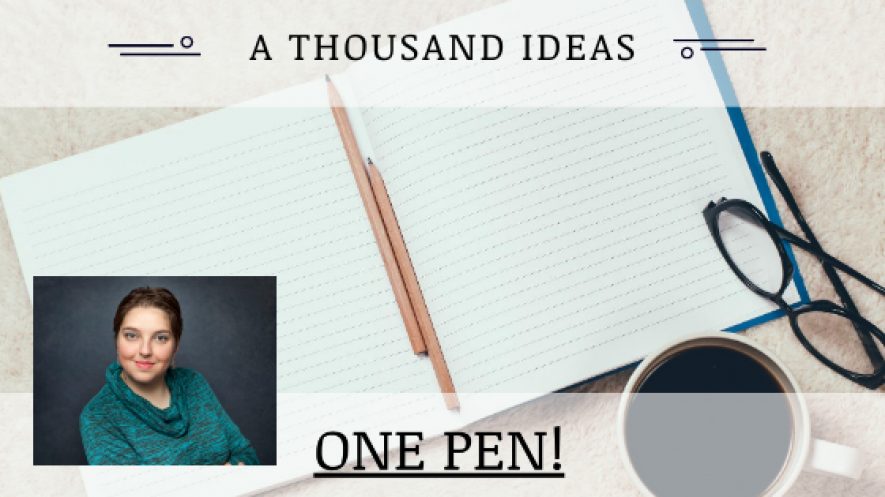If I had to rank the skills of a writer in order of importance the list would look thusly:
- Disciplined persistence/focus- these two are inseparable and form a kind of positive feedback loop.
- Critique- both the giving and receiving of such, identifying useful from not so much, etc.
- All the other writerly things in whatever order seemeth thee good.
The various structural and artistic skills of writing come to each of us in different orders, based on the level of talent and skill we bring to our careers. The more you do it, the more those will build on each other over time. So improve your craft, for sure, but don’t get so concerned about your prose that you lose sight of bigger picture issues. Furthermore, the artistic stuff is variable, not to mention subjective, there is no clear advantage to pursuing one’s characterization technique over one’s plotting ability.
No, the only advantage comes from dedication to Butt In Chair-Hands On Keyboard (BIC-HOK) style discipline and the constant improvement of your work not from your own eyes, but someone else’s. Others have filled volumes* with how to cultivate focus and persistence in your writerly ways, so I won’t go down that road. Rather, I think the skill of being a good critique partner and appropriately utilizing the critique of others is woefully undervalued and still a mystery to too many writers looking to improve.
So let’s see what we can do to demystify the process and amplify those skills, shall we?

Photo by fauxels on Pexels.com
First, let’s take a deep breath and realize that perfection in communication is not possible.
We may revel in coming up with just the right turn of phrase or get a little giddy when we see how the plot twist at the end is going to both unhinge and delight your readers. But that doesn’t make them perfect. No one can communicate mind to mind (yet). So the best anyone can do is try, fail, and refine until they get to something that is close enough.
Do you know what this means? THERE”S NO PRESSURE TO BE PERFECT!!
But here’s the best part, since no one can perfectly put their thoughts into words, there’s no such thing as a perfect story.
Take any of the classics you like. You will find run-on sentences, awkward phrasing, typos, bad dialogue (so much bad dialogue), and all kinds of stylistic wonkiness that may have worked for its time, but isn’t working now. Tastes, trends, and techniques change. And that’s great.
It doesn’t give us permission to be lazy. Please don’t take the pass on perfection as a pass to write poorly and not try to improve. We need to edit. We need others to help us edit. But then we need to be done. We need to let the project go, and move on to the next so we can continue to improve and grow as storytellers.
Author Julie Berry once said, “It’s ok if you write a mediocre book. The world is full of mediocre readers.”
This was a kidding, kinda, moment from a keynote she gave at the ANWA Time Out for Writers conference a number of years ago. But I’m betting it made you feel a little less like the universe is lurking over your shoulder, demanding the highest quality product ever, before it will allow your manuscript to see the light of day.
You might be saying, “But I pick up errors in books all the time. I’m a really good editor.”
And that may be true. Most of us who get into writing started as voracious readers. We know what we like in a good book or essay. We can spot a bad comma-splice a mile away.
In someone else’s work.
No one can see their own work clearly. All the story, character, and setting stuff that you have tucked away in that big, thinky noggin of yours gets in the way of your ability to separate what you see from what the reader will see.
You may describe the protagonist’s jacket as blue. Which you understand means it’s the same cerulean of the eyes of his lady love from so very long ago; clearly indicating that he is still carrying a torch. So when a would be mugger tears the jacket in the next chapter, it makes sense that he flies into a rage, and doesn’t merely fend the attacker off, but beats him senseless.
All the reader knows is that the jacket is blue. Not even what kind of blue, just blue. And what the heck is wrong with your main character that he would display such violence?
See the issue? We fill in the gaps for ourselves, especially after we’ve seen a chapter on our screen (or in a notebook for us old school types) again and again. It solidifies in our heads as being the prefect representation of what we are thinking because we can’t uncouple our meaning from our writing. So much of the subtext that we take for granted has to be on the page in some way, so that the reader has access to it, too.
This means that when you are getting feedback, good feedback, it’s not about you as a writer. It’s just about helping you get all that beautifully imagined wonderment onto the page so that the reader can see it. Too many writers think that the best outcome of a critique is, “I loved it! It’s amazing! It doesn’t need anything else, except I fixed one uncapitalized ‘I.'”
That is not the best outcome. This is a less than useful outcome.
It is the sign of a critique partner who doesn’t know what they are doing. Maybe they don’t have the experience to help improve your writing (maybe they are newer at this than you are). Or perhaps they are your grandmother who likes you so very much and doesn’t want to say anything discouraging and here dear have a cookie.

Photo by Andrea Piacquadio on Pexels.com
When hunting for good critique partners we are looking for folks with the skills not only to point out where the commas and the quotation marks should go, but who can say in a thoughtful, objective, helpful way how we can improve our composition as a whole. They say things like, “I’m confused by this word choice, do you mean x or y?”, “Why do we need to know this right now?”, or “How does the protagonist feel about what’s happening here?” These are the kinds of feedback that point an author to real improvement and awareness of where their own pitfalls lie. It gives them the opportunity to fix what’s broken, based on their own vast knowledge about their story or topic.
Good critique partners never seek to transform another’s book into the book they would have written (more on this in later posts), but to mold a Work In Progress (WIP) so that it more closely resembles the vision the author has established for their own work.
And how do you attract such helpful helpers?
- Read my subsequent posts to discover techniques that will make you a valuable critique partner.
- Find writer’s groups (most likely all virtual right now) and practice those skills by reading for others. This will invite others to read for you as well, and give you practice recognizing useful from useless feedback.
- Don’t drive good critique partners away with either hostility or constant explanations about why you are right and don’t need to change what you are doing.
- Remember that perfect is not possible. For anyone. So let that nonsense go.
The fastest way to ensure that others decline to read for you is to rebuff every bit of input with snappish comments or constant explaining about why you did the thing they are finding confusing/over-wrought/incorrect. You won’t be able to follow around every reader explaining bits of the book to them.
The book must explain itself.
And you are doing neither the story nor yourself any favors by acting like a shield warrior, deflecting all incoming missiles of correction. There are no prizes for rough drafts with less red ink on them than others.
So let’s get the blood bath going.
We can sop up the mess later.
You’ll find that writing doesn’t scar. The reader can’t tell you were corrected before they read the sentence. They can only tell when no one corrected that sentence/chapter/story arc at all. And they don’t appreciate that kind of disregard.
Ready to get into more of the nitty gritty?
Good. Next time we’ll talk techniques and best practices. And I’d love to hear your horror stories about bad critique partners, if you’ve had them, in the comments. It’ll remind you and everyone else how important giving and getting good feedback can be.
~Anika
*Here are just a few of the titles that might interest you if persistence is your weak link: The War of Art by Steven Pressfield, Bird by Bird by Anne Lamott, The Artist’s Way by Julia Cameron, Grit by Angela Duckworth, Take Joy by Jane Yolen, Deep Work and So Good They Can’t Ignore You by Cal Newport, Atomic Habits by James Clear, and many more. I’d love to see your suggestions in the comments!

Good critique partners are worth their weight in scorpion venom.
Or platinum. Or chocolate!
“The book must explain itself.”
I love this point. I too have often read for other writers, only to have them justify every comment I’d made, which I thought was rather counterproductive. Thanks for sharing this!
Counterproductive for sure! I think many writers assume that fixing a critique partner’s understanding or perspective is the same as fixing the work itself. They have no idea what a disservice they are doing themselves.